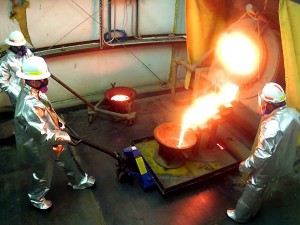 In a recent article by Dawn Cranfield in The Guardian Express entitled A Mining Company with a Heart of Gold – Comstock Mining, Inc., the author draws attention to what makes Comstock a very different kind of mining company:
In a recent article by Dawn Cranfield in The Guardian Express entitled A Mining Company with a Heart of Gold – Comstock Mining, Inc., the author draws attention to what makes Comstock a very different kind of mining company:
“Comstock Mining, Inc. had their first pour of gold and silver doré, unrefined gold bullion, on September 29, 2012; in October, they hosted a three-day community event celebrating the historic event. The return of mining to the historic Comstock mining district and the community at large means more than just the gold and silver being mined from the hills, it is about the pioneering spirit of a company and the revitalization efforts of the people involved.”
Comstock Mining is, perhaps, the first mining company in the world to apply a systemic management approach to mining. Supported by Intelligent Management, Comstock is applying the Decalogue Management Methodology. Why does that make it so different? Because it means understanding that the organization is an open system that continuously interacts with its environment. Leadership and management decisions have to continuously take into account not just what goes on inside the company and its own goals, but also the input and output and how that affects its environment and community:
“…this exceptional mining company [is] not exclusively interested in exhuming all of the gold and silver they can find and leaving a barren landscape behind; they have a rather different perspective, especially in terms of working in the historic Comstock Lode. John Winfield, the Company’s Chairman is by all assessments, an environmentalist with a love of nature, having received recognition from the National Humane Society and others for his protection of endangered animals and wildlife. Comstock Mining, Inc. has a covenant to preserve, protect, enhance, restore, and celebrate the Comstock Lode, and they have made a commitment to the community and the territory as a whole.
In the state of Nevada, there is no requirement for reclamation (restoration of the land) when a mining company is finished with their project on an open-pit or surface mine, other than to secure the area for safety. Shocking. Still, Comstock Mining, Inc. has pledged 1% annually of gross revenue towards reclamation. They plan to grade, reseed the area using native grasses, and to leave an area exposed for tourism purposes.
First Dore Pour 09/28/12
In her article, Cranfield later points out that Comstock has made repairs to the Dayton Consolidated Mill when they saw it was in need of maintenance, and they have also purchased the old Cabin in the Sky; a dilapidated restaurant that they want to restore. They have also purchased the Gold Hill Hotel that was up for sale, maintaining jobs that were in question. Beyond Comstock’s interest in revitalization of the historic mining area of the Comstock where so much has fallen into disrepair, Cranfield is also impressed by the attitude of the CEO towards his staff:
“It isn’t just the economic development and revitalization efforts that make this mining company so distinctive; it is the way they treat their employees.
Dayton Consolidated Mill
Marcus, a young miner talked to me one evening, “That guy over there,” pointing to the CEO, Corrado De Gasperis, “Makes me love my job. What other CEO would know every one of our names? Or would even care who we are?” Just then, Corrado walked up and greeted the young man and his two companions by name.”
When leaders and managers understand their organizations systemically, when they see the interdependencies that exist within their company and with the outside environment, then they are poised to do business in an intrinsically ethical and sustainable way. They are pioneers of a new kind of capitalism that sees no conflict between their own profit and the common good.
Intelligent Management wishes you all a happy holiday season and a fulfilling 2013. See you in the New Year!







A great example of a company employing Adaptive Management techniques and striving to achieve the “Social Licence to operate” by returning the landscape to a natural and functional form as well as encouraging community involvement.